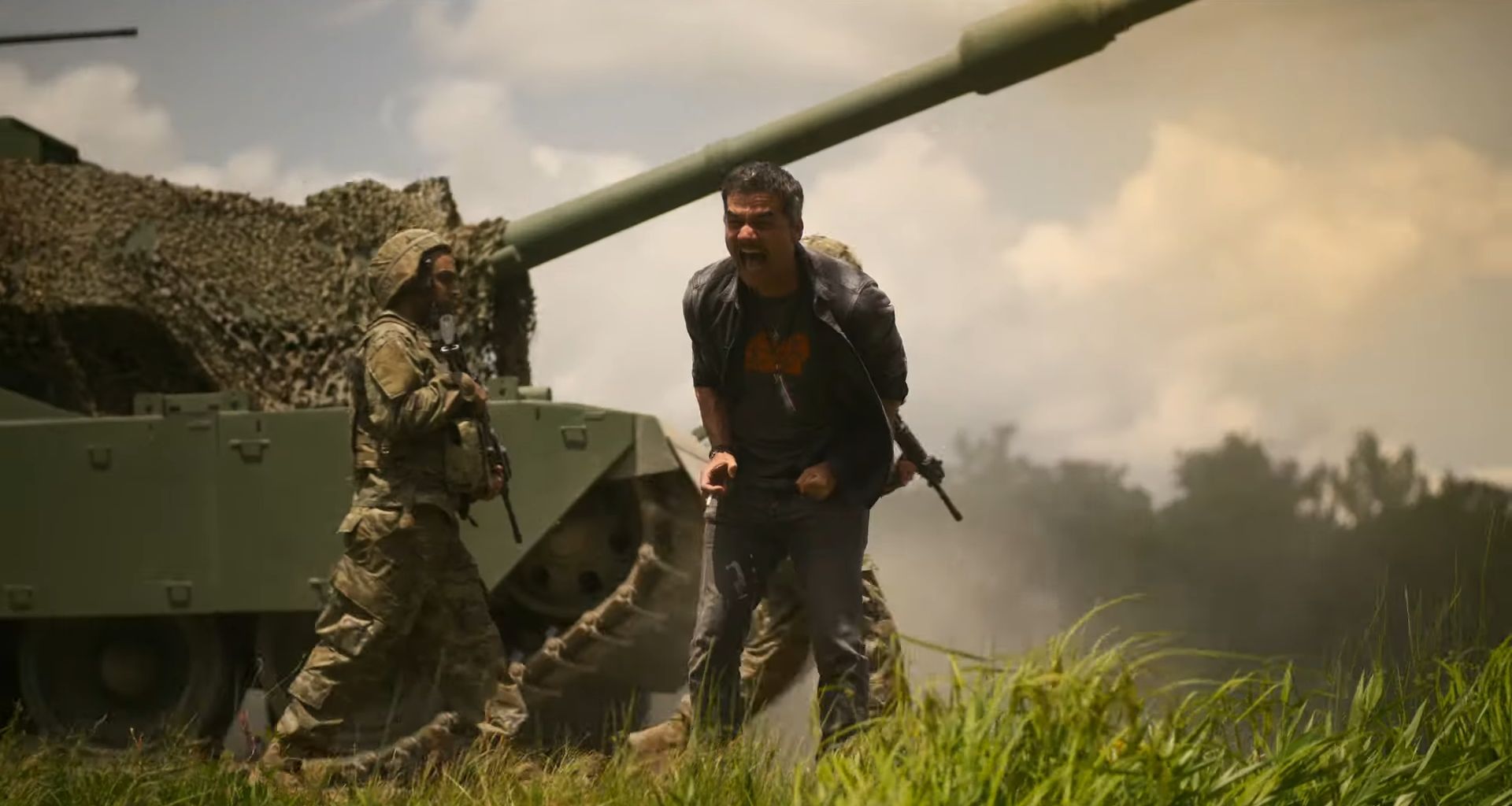Ah, Hollywood war movies.
We’ve seen it all.
American soldiers fighting a war they believe is just, American soldiers fighting a war they believe unjust. The soldiers attacked at their home, the soldiers organized or caught off guard in enemy places. Civilians in various capacities: at their home, at the enemy’s home, caught between two fires on a neutral field. The real enemies (Germany / Russia / Vietnam / Afghanistan / Iraq), the unknown enemies (the Rogue State), the invented enemies (I don’t know, Sokovia), the Martians as an excuse to get rid of any moral encumbrance.
Until now, a fictitious second American civil war was the stuff only of grotesque satires, or imaginative dystopian-style scenarios Twilight Zone filled with black humor.
Until today.
Welcome to the end of April 2024, where the prevailing mood is that if you were to disconnect from the internet for a week and upon returning they told you that civil war has broken out in America, you wouldn’t reply “what the hell are you talking about Willis” but “eh, wow, I’m sorry.”
THEME SONG!
I imagine Alex Garland is noticing, like many, the lack of Oliver Stone.
Qualitative distance and very different lives aside, they have had similar paths. They both started out as screenwriters: while Stone was writing Midnight escape, Scarface, The Year of the Dragon And Conan the BarbarianGarland wrote, um, The Beach, 28 days later, Sunshine And The Raid Dredd. And both began directing by gaining experience in the genre before throwing themselves into the “big picture”, but here Garland, with Ex Machina And Annihilationhe certainly started out more advanced than Stone who had started with exercises like Seizure And The hand.
Stone was once the raging madman who launched into impassioned political blockbusters and challenged hard-nosed controversies. He was the one who uncovered and reread uncomfortable stories, the one who launched direct and passionate accusations even at the risk of seeming crazy, but also the one who Hollywood sent forward to represent the most delicate current affairs before anyone else, like a true expendable: the first to bring the 9/11 attack to the big screen (along with United 93), and the madman ready to challenge the incumbent (incumbent!) President with a semi-parodic biography. Coincidentally (or not) they were also his most popular films: World Trade Center it put aside all controversy and conspiracy and was entirely focused on a firefighter trapped in the rubble (I would pay to see what Stone would choose instead to tell today), while W all in all it was easy and could be summed up with “Bush Jr is stupid but come on, after all he tries hard”. However, it is undeniable that the void left by Stone is starting to be felt: Oppenheimer echoed in its own way projects such as JFK or Nixon in Nolan sauce, while Civil War quotes much more directly Salvador.
MVP hands down
MEN it’s not exactly the best calling card for Garland in terms of a project like Civil War: it had a certain reckless and in its own way admirable expressive courage, but it was also the arrogant and clumsy attempt to make the definitive metaphorical film on an issue – the condition of women oppressed by patriarchy – which he had clearly grasped only up to a certain point. It was a cynical, presumptuous, and at best banal film.
If the Londoner Garland claimed to be able to describe the current tensions within the USA with the same attitude – that of wanting to cling to the important social trend of the moment and propose himself as a caravan leader regardless of the depth and even relevance of his specific vision – we were done for. Whichever way he wanted to take it. From one extreme, from the other, and also from the declared attempt to show off a neutrality that invited us to iron out differences.
But hey, the concept was undeniably powerful: you want to put? Be the first to imagine an internal armed conflict within the USA from a very serious, plausible point of view and probably never so close since 1861? Getting there now, with the presidential election campaign in full swing? And come out (in the USA) on April 12th, on the anniversary of the first civil war, in a sort of anti-Independence Day? It was potentially the definitive “living room discussion movie” of the year. Or the film to argue about during the (fortunately distant) Christmas dinner. Garland is developing a nose for these things that Adrian Lyne doesn’t have with sexual tensions between couples in the 80s/90s.
The eyes of innocence that will be led astray by the violence that men blinded by an incomprehensible hatred etc… etc…
However: I know that Garland isn’t stupid deep down, because beyond everything you can’t come up with a gem like that Ex Machina if you’re stupid. And, like Raheem Sterling who refused to take a penalty against Italy in the European Championship final for fear of missing it, Garland actually veers – in a fit of shyness or intelligent self-awareness – towards a structure that allows him to avoid the most sensitive and hot that would risk ruining the atmosphere on social media.
Civil War begins with the civil war now well advanced and drawing to a close.
It doesn’t say the what or the why: it starts straight and without preamble since everyone has forgotten about it a bit, and when by now presumably everything has been seen on both sides.
Civil War it goes straight to the consequences. And the consequences are… well, nothing too different from The Last of Us if he had had the honesty to get rid of the mushroom zombies altogether, in many ways.
It is legitimate to consider him cowardly on one hand, but on the other it is also actually an inertia that the film actively exploits: the suggestions are truly more than enough. Anyone can imagine what happened. Garland can afford to be generic because anyone, regardless of where they stand, and unless they have spent the last ten years meditating in the Gobi desert, can easily recreate at will in their head a plausible version of events that reflects and justifies the same scenario occurs. And it is a current, heartfelt thing that can give legitimate shivers without the need for further nudges.
The game of the film is more or less openly this: the protagonists are expert war reporters made cynical by having seen the same scenes multiple times around the world, for equally multiple and opposite reasons. Their push to attempt yet another adventure – to go and interview the President before the coup is completed – is the vain hope that perhaps, this time, documenting and reporting will help to learn the lesson for the next occasion.
You will meet people who have found Civil War “chilling” even if there are plenty of films out there that dig much deeper and even harder into completely comparable scenarios, but Garland’s premise is based precisely on being able to propose the same lesson again, without necessarily the obligation to say or show something new, aware of the fact that to hit the target it is sufficient to remove the safe distance from a war that we are used to seeing take place elsewhere, geographically and/or temporally. And honestly: I’ll give you credit for this one. It’s really an intense and interesting experience (also) like that.

Casual Friday
Garland therefore relies on rather classic characters: the veteran photographer hardened by years of experience (an immense Kirsten Dunst), the aggressive young photographer whose naivety accompanies the viewer’s external gaze (the eternal 12-year-old Cailee Spaeny), the passionate reporter who acts as an intermediary between the two (is it right to call Wagner Moura “the Pedro Pascal of the discount store”? No, he deserves much more, but in fact that is his function here – he’s even called Joel!) and the elderly mentor ( Stephen McKinley Henderson). All four remain more archetypes than anything else.
Their journey will put them in front of tense and violent scenarios but all in all already seen, and no more refined than the best war / dystopian / post-apocalyptic films – the most interesting notes are in the occasional references to those who manage to ignore the war and get by as if nothing had happened, like the bored young owner of the clothes shop who keeps it open even when there are two snipers in the building opposite.
Garland generally has an appropriately dynamic staging, but when in doubt he always simplifies – especially in the screenplay phase – pursuing at all costs the tone of a great classic accessible to all. It’s not even really 100% neutral (it’s impossible): the President, in his two shades two, can remember Trump, but this means that the Capitol this time is stormed by the others, and there is no confirmation or judgment and there all the rest of the context and chronology is missing. Allied states are casually mentioned, and Texas teaming up with California immediately overturns any obviousness, demonstrating that every occasional reference is purely functional in order not to break the credibility of the context with too many dialogue acrobatics, and should not be overinterpreted. Because in short, do you want to deny yourself, I don’t know, a powerful phrase like “What kind of American would you be?” uttered by Jesse Plemons in the trailer’s pivotal scene? That is the expert screenwriter’s coup, who then pigeons the character into a type of psychopathic extremist without too many explanations from which it is easy to distance oneself even when one has (let’s put it this way) comparable ideological tendencies. More annoying is the fact that, quietly, while you’re thinking about something else, you put in the stereotype of the tough woman who rediscovers her humanity when she ditches her jeans and t-shirt and tastes the pleasure of wearing a more classic dress again.

A bad thing about the war happened here
Even sensing what Garland is trying to do, and even being partially in favor of it, I walked away from it Civil War sincerely perplexed. The alternation between obvious but effective/powerful moments and obvious moments and that’s it, although always shot in a very dignified way, leaves a bit of a bad taste in the mouth. During the climax all the balances are thrown off: coherently with what has been done up to that moment Garland directs you to focus on the little girl and on the hope that she will bring home all the important shots of the case, but what is happening around her this time is unfortunately much more interesting , it’s ok to hammer on the importance of information but we get too close to the real crux of the story to ignore it again in the name of ostentatious neutrality. One wonders if this is not ultimately the type of film which, in its excess of non-specificity, loses its strength once removed from the cultural context in which we spectators are today and adds a substantial emotional bonus due to the tensions that we are still living. Its destiny seems to be rather to become the classic generic reference that in the future at every good moment we will use to say “hey, this movie was foreseen!” (hoping, of course, that it doesn’t happen). If you’re only interested in the action side, watch Paul Greengrass’ stuff instead, but apart from that nothing to say, discussions in the living room are guaranteed.
Instagram post quotes:
“Look at the hate we’re breeding
Look at the fear we’re feeding
Look at the lives we’re leading
The way we’ve always done before”
Guns’N’Roses, Civil War
Instagram story quote:
Steve Rogers / Tony Stark, Avengers
>> IMDb | Trailer
PS: Alex Garland’s next film is called Black Lives Matter.
Ok that’s not true, but you all just fell for it.











